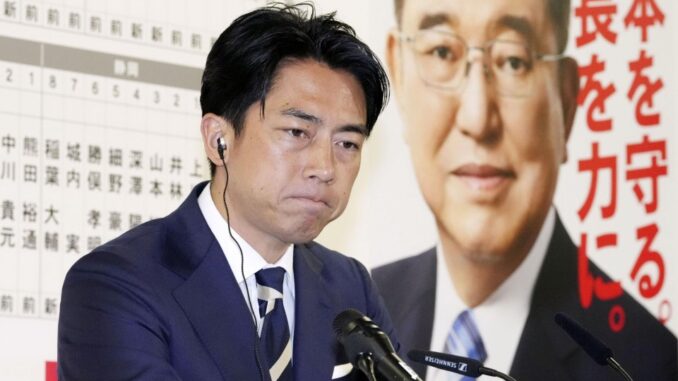
TOKYO—Japan’s ruling Liberal Democratic Party is set to lose its majority in the House of Representatives after Sunday’s general election, a Kyodo exit poll showed, in a setback for Prime Minister Shigeru Ishiba.
The projected outcome underscores voter distrust in the LDP after a slush funds scandal, despite party leader Ishiba promising political reforms while also seeking to attract support with a plan for additional assistance for inflation-hit households.
With a total of 465 seats contested, Ishiba has set a goal for the LDP-Komeito coalition crossing the majority line of 233 at a minimum. Some major opposition parties are likely to increase their seats in the lower house.
While the LDP, which had 256 seats before the election, appears to be facing a tough fight, the main opposition Constitutional Democratic Party of Japan is projected to build on its previous 98 seats, the exit poll showed.
The LDP did not endorse some members implicated in the slush funds scandal as official candidates in the election, and several of them, including former education minister Hakubun Shimomura, are set to lose their seats, the exit poll showed.
Those denied LDP endorsement had close ties with the late Prime Minister Shinzo Abe, who exerted significant influence over the LDP even after stepping down as leader in 2020. The party has not ruled out accepting those of them who win seats later.
The Democratic Party for the People is assured of winning at least 11 seats, up from seven, according to the exit poll. It is uncertain whether the LDP’s coalition partner Komeito and the opposition Japan Innovation Party will be able to retain their pre-election strength.
In the first general election since 2021, each voter cast two ballots—one to choose a candidate in a single-seat constituency and the other to select a party in the proportional representation section. The final election results are expected to be clear by early Monday.
Ishiba dissolved the lower house on Oct. 9, only eight days after taking office.
The 67-year-old premier has pledged to prioritize easing the negative impact of inflation on households, bolstering Japan’s defenses against security threats from its neighbors and enhancing regional economies and disaster resilience.
In the final days of the 12-day election campaign, however, the LDP faced a strong backlash after it was found to have provided 20 million yen ($132,000) to local branches led by its members who did not secure the party’s official baking in the race due to the slush funds scandal.
The funds scandal has continued to haunt the LDP since it emerged in late 2023, driving down public support to levels that ultimately forced Ishiba’s predecessor Fumio Kishida to give up on seeking reelection as party chief.
The CDPJ hopes that public discontent with the LDP, which has governed Japan for most of the postwar era, will support its efforts to bring about a rare change in government.
For the LDP to achieve its long-held goal of amending the country’s Constitution, securing a two-thirds majority, or 310 seats, is a must, or no revision proposal can be initiated before a national referendum.


Be the first to comment